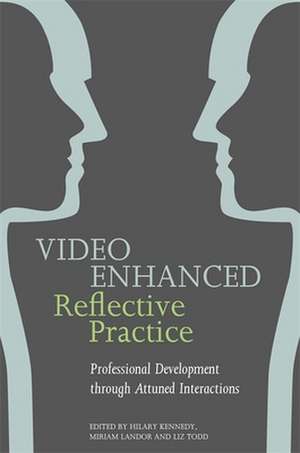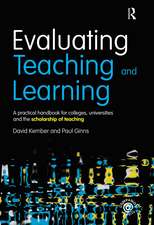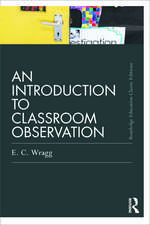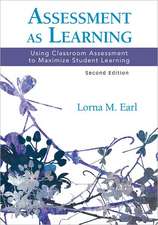Video Enhanced Reflective Practice
Editat de Hilary Kennedy, Miriam Landor, Liz Todden Limba Engleză Paperback – 20 apr 2015
Preț: 286.62 lei
Nou
Puncte Express: 430
Preț estimativ în valută:
54.85€ • 57.41$ • 45.65£
54.85€ • 57.41$ • 45.65£
Carte disponibilă
Livrare economică 10-24 martie
Preluare comenzi: 021 569.72.76
Specificații
ISBN-13: 9781849054102
ISBN-10: 184905410X
Pagini: 336
Ilustrații: B&w figures
Dimensiuni: 150 x 228 x 20 mm
Greutate: 0.45 kg
Editura: JESSICA KINGSLEY PUBLISHERS
ISBN-10: 184905410X
Pagini: 336
Ilustrații: B&w figures
Dimensiuni: 150 x 228 x 20 mm
Greutate: 0.45 kg
Editura: JESSICA KINGSLEY PUBLISHERS
Notă biografică
Hilary Kennedy is a freelance chartered educational psychologist and National trainer and supervisor for the Association for Video Interaction Guidance uk TM (AVIGuk). She is a key developer of Video Interaction Guidance (VIG) in the UK. She is currently working on projects nationally and internationally. Hilary is an honorary senior lecturer at University College London, an associate fellow of the British Psychological Society and is involved in supporting research in the effectiveness of VIG as an intervention. She received the BPS Distinguished Contribution to Educational and Child Psychology Award 2013 Miriam Landor is a freelance AVIGuk supervisor and trainer in VIG, VERP and Video Feedforward, nationally and internationally. She is a chartered educational psychologist and an associate fellow of the British Psychological Society. She previously worked as a preschool home visiting support teacher, an educational psychologist and a university lecturer. She is interested in networking through writing and editing on VIG matters and has published in these and other fields. Liz Todd is professor of educational inclusion at Newcastle University. A chartered educational psychologist, Liz is also an AVIGuk supervisor and trainer in VIG and VERP. Her other books, both prize-winning, are: Partnerships for Inclusive Education, a critical approach to collaborative working; and Beyond the School Gates: can full service and extended schools overcome disadvantage. She is interested in VIG & narrative therapy as democratic approaches to change for individuals and communities. They are the editors of Video Interaction Guidance: A Relationship-Based Intervention to Promote Attunement, Empathy and Wellbeing, also published by Jessica Kingsley Publishers.
Cuprins
Preface. Miriam Landor, AVIGuk supervisor and VIG, VERP and Video Feedforward trainer. Part 1. Video Enhanced Reflective Practice (VERP). 1. VERP: Introduction. Hilary Kennedy, educational psychologist and leading developer of VIG within AVIGuk, and Miriam Landor. 2. What makes VERP successful for system change? Views of participants from a primary school. Jenny Jarvis, counselling psychologist and National VIG supervisor, and Susan Lyon, speech and language therapist. 3. From the beginnings of VERP to today: a collaborative journey between Eindhoven and Tayside. Lia van Rosmalen, Manager of Human Resource and Development at Combinatie Jeugdzorg, Eindhoven, and Hilary Kennedy. 4. How and why VERP works ? the theory underpinning the practice. Miriam Landor. Part 2. Applications of VERP. 5. Perinatal and infant mental health: using VERP. Angela Underdown, VIG and VERP supervisor and Deputy Director of Warwick Infant and Family Wellbeing Unit. 6. Getting to the heart of nurturing relationships in schools: exploring teacher mind-mindedness through VERP. Kirsty Quinn, senior educational psychologist. 7. Making sure that teaching assistants can make a difference: training that uses VERP. Joanna Hewitt, educational psychologist, Stephanie Satariano, educational and child psychologist, and Liz Todd, Professor of Educational Inclusion, Newcastle University. 8. Connect, reflect and grow ? VERP development in the early years. Jo Birbeck, senior educational psychologist, Hampshire, Karen Williams, inclusion team leader for Services for Young Children, Monika Celebi, parent-infant psychotherapist and movement therapist, and Annemie Wetzels, developer of a video feedback coaching programme for lower grade teachers and PhD student, University of Groningen. 9. VERP as a leadership development tool in the banking industry. Maria V. Doria, chartered psychologist and VIG/VERP guider. Part 3. Profound and Multiple Learning Disabilities. 10. Supporting interactions with adults who have profound intellectual and multiple disabilities as their skills deteriorate. Sheridan Forster, speech pathologist and researcher. 11. OIVA ? supporting staff for better interaction with people with complex communication needs. Katja Burakoff, speech and language therapist, and Kaisa Martikainen, speech and language therapist. 12. The indispensable moments of relating: Marte Meo in dementia care. Anna-Greta Ledin, senior psychologist and specialist in clinical psychology. Part 4. Higher Education. 13. Just Conversations ? VERP as a tool for the development of communicative skills in social work practice. Robin Sen, social work lecturer, University of Sheffield, Carole Chasle, senior educational psychologist, Derbyshire County Council, and Bev Jowett, university teacher, Department of Sociological Studies, University of Sheffield. 14. Integrating VERP into medical education. Alex Greene, medical anthropologist, Dundee University, Emma Cartwright, health psychology postgraduate student, and Clare Webster, paediatric registrar, NHS Tayside. 15. Turning the lens on the professional learning and development of trainee educational psychologists. Michelle Sancho, assistant principal educational psychologist, West Berkshire, Helen Upton, senior educational psychologist, Wandsworth Schools and Community Psychology Service, and Joanna Begley, trainee educational psychologist, Institute of Education, London. Part 5. Systematic Approaches. 16. Systematic change in schools using VERP. Ben Hayes, senior educational psychologist, Kent Educational Psychology Service, Lucy Browne, educational psychologist, and Liz Todd. 17. Evolving the delivery of children's services: VIG and VERP supporting organizational change in Glasgow. Sandra Strathie, national VIG supervisor, Fiona Williams, senior educational psychologist, Glasgow City Council, and Liz Todd. 18. Supporting Supporting professional and organizational development in post-school work. Cyril Hellier, Health Profession Council registered psychologist and a Fellow of the British Psychology Society. 19. Sustaining change in complex systems: VERP and the SPIN® Systems Change AssetsTM. Jane P. Nestel-Patt, founder, director, certified master trainer for SPIN®USA: National Training Institute for VIG, USA, Terri E. Pease, Director of Research and a master trainer at SPIN®USA. Part 6. Evidence. 20. Effects of video-enhanced reflective practice: Current evidence and future challenges. Ruben Fukkink, professor (lector), University of Applied Sciences of Amsterdam and professor, Early Childhood Education and Care, University of Amsterdam, Sanne Huijbregts, teacher and researcher, Department of Education, University of Applied Sciences of Amsterdam, and Liz Todd. 21. Improving interactions improving literacy in early years: an evaluation of a VERP / literacy pilot. Nancy Ferguson, deputy principal educational psychologist, North Lanarkshire Council, Scotland. 22. 'Containing conversations': introducing VERP into a secure forensic service for adolescents. Helen Gibson, systematic psychotherapist and supervisor, Martin Eliott, clinical nurse specialist and clinical team manager, Wiltshire, and Emily Archer, Psychological Practitioner within primary care. Part 7. Conclusion. 23. Reflections on the potential of VERP to support agency in professional reflection and development. Wilma Barrow, educational psychologist, Scottish Borders Council, and Liz Todd. References. Glossary. Author Information.






